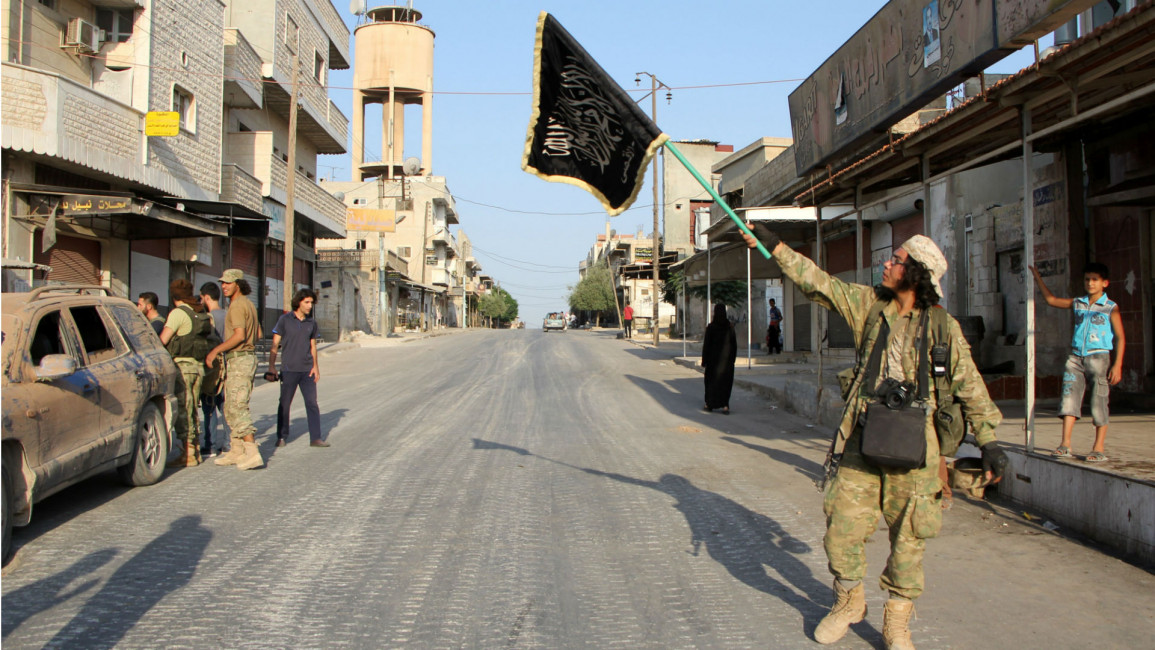
Syria's jihadist scene regroups around new, tactical alliances
Syrian Jihadi group Jund al-Aqsa has pledged allegiance to Jabhat Fateh al-Sham (JFS), al-Qaeda's freshly rebranded branch in Syria.
The move may be an indicator of several new trends on the jihadist scene, namely the difficulty for small jihadi groups to survive in the long run, the will of JFS to consolidate the Jihadi front and avoid useless blood spill, and the realignment of jihadist groups away from the Islamic State (IS), as it weakens in Syria.
Clashes erupted between Jund al-Aqsa and Ahrar al-Sham when it attempted to abduct Ahrar al-Sham's security officer in Saraqeb in Idlib province, according to one source, who wishes to remain anonymous. The incident which resulted in the stabbing of one fighter was followed by more clashes between Ahrar al-Sham and Jund al-Aqsa in Hama.
"The conflict between the two groups is ideological, Jund al-Aqsa is a takfiri group whose ideology is more in line with that of the IS, it also does not approve of the moderate discourse adopted by Ahrar Sham," says the source.
The rivalry reached unprecedented levels in 2015 when Jund al-Aqsa withdrew from the Jaysh al-Fateh ("Army of Conquest") alliance, jointly led by Ahrar al-Sham and JFS because it did not want to fight IS.
"Jund Aqsa elements are behind many of the killings of activists and opposition figures in rebel areas, mainly through the use of Improvised Explosive Devices (IEDs)," adds the source.
A leaked video on YouTube showed the confession of a young Jund al-Aqsa fighter admitting to killing political figures for the account of IS. Last January, Jaysh al-Fateh executed a Jund al-Aqsa fighters cell in Idlib city for carrying out assassinations on behalf of IS. Jund al-Aqsa was placed last September on the list of designated terrorist organisations by the US State Department.
 |
The attractiveness of more powerful and established Salafi groups makes the survival of these organisations more difficult |  |
According to the source, the Jund al-Aqsa organisation is comprised of both foreign fighters and Syrians, and operates mostly in Idlib and Hama. "It was created in late 2013 when IS broke away from the Nusra front, by those who chose not to side with either group in the ongoing dispute," says Sheikh Hassan Dgeim, a Syrian scholar following jihadist organisations in Syria.
Founded by Sheikh Abdul Aziz al-Qatari, who fought for al-Qaeda in Afghanistan and who was close to the father of Jihad - Osama bin Laden, the group has adopted officially a line close to the Nusra Front, however it is believed that its foot soldiers were ideologically closer to IS, with whom they were collaborating.
Sheikh Dgheim says that the group boasts 250 fighters, a number that can swell to a few thousand during battles, thanks to alliances with other jihadi groups. It appears to be Syria centered and does not seem to have a western agenda.
 |
'It is nonetheless too soon to tell how this pledge of allegiance will truly impact the Syrian jihadi scene' - Sheikh Dgheim |  |
The consolidation of Jund al-Aqsa with JFS is an indicator of the new trends shaping the Syrian jihad. Although Jund al-Aqsa - as other jihadi groups have been able to position themselves as independent players up until now - the persistent friction with other armed groups and the attractiveness of more powerful and established Salafi groups, make the survival of these organisations more difficult in the long run. As a result, they are more likely to be absorbed by larger groups.
The new pledge of allegiance shows the will of JFS to position itself as an arbiter of sorts on the salafi jihadist scene. When the clashes erupted, JFS was quick to issue a statement accepting the integration of Jund al-Aqsa. This move underlines JFS's will to prioritise the unity of jihadi groups, specifically in times of important battles, as President Bashar al-Assad's forces gain ground in Aleppo province.
Finally it also emphasises the difficulty for smaller groups to independently navigate the polarised jihadist scene divided between a "reformed" JFS and IS.
In the days after the pledge, Jund al-Aqsa fighters who were charged for committing crimes on behalf of IS will be prosecuted by a Sharia board.
"It is nonetheless too soon to tell how this pledge of allegiance will truly impact the Syrian jihadi scene, given that it will ultimately be shaped by the struggle within JFS which is divided into two opposing currents, one advocating greater unity with al-Qaeda, the other greater Syrianisation of Jihad," says Sheikh Dgheim.
Mona Alami a non-resident fellow with the Atlantic council covering Middle East politics with a special interest in radical organizations. Follow her on Twitter: @monaalami
Opinions expressed in this article remain those of the author and do not necessarily represent those of The New Arab, its editorial board or staff.




